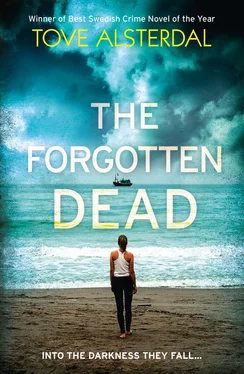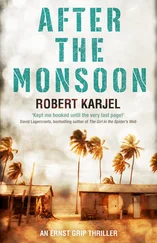‘An immigrant. From the sub-Sahara,’ said the officer, standing up. He went over to a map of Europe hanging on the wall. It also showed the northern part of Africa. Terese knew that boats went there from Tarifa. The crossing to Tangiers took thirty-five minutes and cost twenty-nine euros per person. Her father had picked up some brochures at the tourist office. Terese wasn’t particularly interested, but she hadn’t told him that. She didn’t want to upset him. When he’d suggested the trip to southern Spain, she’d pictured Marbella and sunny beaches and nightclubs. In Tarifa the wind never stopped blowing. She’d tried swimming on their first days here, but ended up feeling panicked when she was tossed about by the waves as the rip current dragged her away from shore.
‘When they come this way, they’re mostly fleeing from the countries south of the Sahara,’ said the officer. He pointed at the map that hung on the wall of painted brick. ‘Mali, Nigeria, Sierra Leone. Several years ago we were bringing in overloaded boats every single day.’ He moved his hand over the sea, out into the blue of the Atlantic. ‘Later more people started taking this route, via Senegal to the Canary Islands, then through Libya, of course, it’s a total chaos there, and then the Turkey route … The smugglers know we have coastguard boats patrolling the straits, with cameras and radar. But that still doesn’t stop some people from trying.’
Stefan Wallner translated for Terese, who relaxed a bit. She was already familiar with some of these facts. When she was lying in bed yesterday, wanting only to fall asleep and die, her father had gone out to talk to the police and the Red Cross. He came into her room every couple of hours to ask whether she wanted anything to eat. He sat on the edge of her bed and stroked her hair and told her about all the unhappy people who were fleeing poverty and possibly war as well. The head of the Red Cross in Tarifa had shown him pictures of people who had died in the sound during the past few years. He’d had an entire binder full of photographs. Whenever Terese closed her eyes, she saw the body of the black man and thought to herself that she was looking at death. And then she’d felt the old sorrows well up, from her teenage years in high school when she’d realized how meaningless everything was, and that it didn’t matter what she did because she was nobody. Could anyone love a nobody? No one would notice if a nobody died. ‘There’s nothing I want to do, Papa,’ she’d said. ‘I don’t know if I even want to go on living.’
The policeman went over to one of the windows and used his whole hand to point outside. Terese shivered when she saw the barbed wire and seagulls. She looked at the island out there, the surging waves and the lighthouse. She never wanted to go down to the sea again.
‘If we catch them, they end up on Isla de las Palomas,’ he said. ‘A few years ago the place was packed, but these days we keep them only twenty-four hours, at most. Then they’re sent to the detention camps in Algeciras. If we can’t get them to tell us where they came from, they’re released out onto the streets after sixty days. After that, they’ll be picking tomatoes.’
The officer came around his desk and picked up a document. A flimsy piece of paper.
‘But I’m talking about the ones who make it here alive, of course.’
He sat down, again spreading his legs wide, and gave a sharp slap to the paper in his hand.
‘This arrived by fax from Cádiz early this morning. They’ve found two more. A man and a woman. Pregnant.’ He picked up another piece of paper and held it up. ‘The Moroccan authorities have reports of a rubber dinghy that set off in the early hours of Sunday morning. It managed to slip past. Maybe somebody was bribed. Who knows? These smugglers will try anything.’ He used two fingers to smooth his old-fashioned moustache, which turned up slightly at the ends. ‘They tell the passengers to jump into the sea when they get close to land so the smugglers can turn the boat around before we catch them.’
‘Have you identified them?’ asked Stefan Wallner. His hand was still on Terese’s shoulder, occasionally giving her a light pat. Protecting her. She was ashamed that she’d lied. She was ashamed that she’d been abandoned on the beach. It was horrible that people were dying in the sea.
The police officer grinned. ‘How would we do that? So far we haven’t found anyone alive.’
‘But I told you he had a tattoo,’ Terese said.
‘They already know that,’ said her father. Terese bit her lip. Reprimanded, just like a child. Yet she was twenty years old.
‘If they’re Moroccan, we contact the Moroccan authorities directly,’ said the officer. ‘And they’re here within twenty-four hours. But if we’re talking about sub-Saharans, there’s not much we can do. They have no identity papers, and even if they were alive, we couldn’t get them to tell us where they’re from.’ He shrugged. ‘We take blood samples and fingerprints, of course. And keep them on file.’
He shuffled all the papers into a neat little stack. Terese looked down at her hands. She could feel his eyes on her. Her bottom felt sweaty against the plastic of the chair.
‘And you didn’t see anything else on the beach?’ he asked.
She shook her head. ‘It was totally deserted. Nothing but a few seagulls.’
The officer turned to Stefan. ‘If she saw anything that might lead us to the smugglers, we want to know about it. These are criminals we’re talking about here.’
Stefan turned to Terese. ‘So you really didn’t see anything? No boats? No people?’
She shook her head as she spun the ring she was wearing. It was gold, in the shape of a heart. A confirmation present from her father.
‘Then all we need to do is write up your statement,’ said the officer. He pressed a button on his desk and a buzzer sounded outside the door.
‘My assistant will take care of it. We’ll want the precise time and where the victim was found.’
He narrowed his eyes and leaned across his desk.
‘And I also want the name of the person you were with. Or maybe there was more than one.’ His gaze slid over Terese’s body. She shuddered, thinking that she would need to take another shower when she got back to the hotel. That was how he made her feel. Dirty.
‘Did you get paid for it, or do you let them do it for free?’ he said.
At that point her father finally stood up and slammed his hand on the desk. ‘Enough. Stop harassing my daughter. She’s told you everything she knows.’
The door opened and another police officer came into the room. Terese recognized him. He was the one who had shown them in when they arrived. He looked nice. She got up and turned, about to leave.
‘We also need to report that your passport was stolen,’ said Stefan.
‘No, don’t, Papa,’ said Terese, taking him by the arm, but it was too late. He had already started talking to the officer about her missing passport.
‘Are you telling me it was stolen on the beach? But she said there wasn’t anyone else there. That doesn’t make sense. I don’t understand.’ The officer smiled broadly, the gap in his teeth like a black hole in his mouth. ‘So which of them do you think took your passport? Or was it a form of payment?’
Читать дальше












